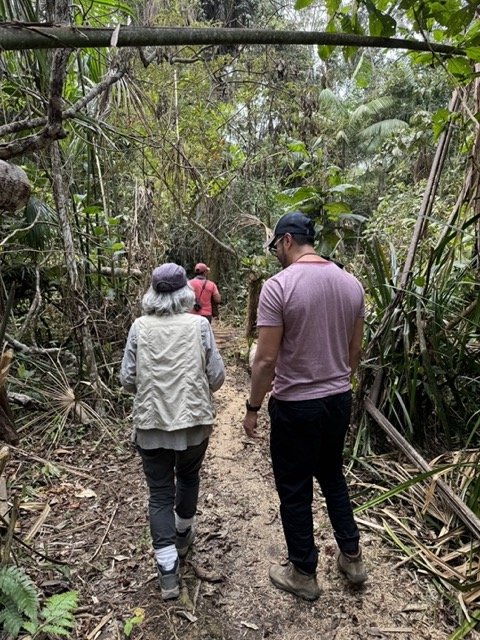Obstacles and Opportunities in Bolivia
Exploring La Senda Verde’s Passiflora in the Bolivian Amazon.
By Lindsey Zehel, Executive Director | Defend Them All
I am pleased to report that our planning and visioning trip for DTA’s Advocacy Abroad Program in Bolivia was a huge success. The La Senda Verde team were graciously welcoming hosts. They opened their homes, shared their favorite foods and traditions, showed us beautiful places, introduced friends and partners, and went out of their way to help us understand the complexities of animal and environmental advocacy in Bolivia.
I am thoroughly impressed by La Senda Verde’s compassionate and holistic approach to animal and environmental advocacy. In addition to providing exceptional care for animals rescued from wildlife trafficking and habitat loss, the organization is wholeheartedly committed to raising awareness about issues affecting biodiversity and inspiring action to protect and restore the natural world. As a trusted neighbor in their community and a highly respected resource for information and support throughout the country, they advance this mission everyday. I feel fortunate to have spent time at the sanctuary and Pasiflora with founders Vicky and Marcelo, and the La Senda Verde team. Having experienced firsthand the love and stewardship that define everything they do, I am excited about collaborating in our shared efforts to defend animals and ecosystems in Bolivia and beyond.
Challenges
Fires currently raging in the Chiquitania region are the most visible and immediate threat to animals and their habitats in Bolivia. With over 7.2 million hectares of forest consumed in 2024, the devastation already far exceeds historic fires of 2019 (4.2 million hectares). Loss of life for those that can’t outrun, outfly, or outswim the flames is staggering. Millions that manage to escape will undoubtedly suffer without access to food, water, and shelter as their ecosystems are destroyed. Millions more will suffer long-term health and behavioral consequences of inhaling smoke.
Smoke-filled skies from record-breaking forest fires.
Importantly, fires are not “natural” or “normal” in these ecosystems, nor accidental. In fact, a vast majority were intentionally ignited by humans to expand agricultural land and provoked by laws that favor industrial agro-business over forests - a recurring symptom of a system that sacrifices irreplaceable natural resources for unsustainable economic gains.
Likewise, natural resource extraction poses a significant threat to Bolivia’s biodiversity. Illegal mining activities, primarily small-scale privately owned metal mining cooperatives operating without proper titles, are common and widespread, and often overlooked despite blatant violations of labor laws and environmental regulations. Mining cooperatives wield substantial political and economic power, allowing them to invade protected areas with destructive machinery, explosives, and chemical contaminants, facilitated by gray areas in Bolivian law and minimal oversight.
In contrast to Ecuador, large-scale mining projects are less prevalent in Bolivia and currently rank lower on the list of concerns for local advocates. However, as gold prices rise and demand for lithium soars, I fear that a major shift could soon arise. The Bolivian government has recently taken steps toward industrializing lithium extraction and battery production, putting the country’s iconic salt flats—Uyuni, Coipasa, and Pasto Grandes, which hold the world’s largest lithium reserves, estimated at 21 million metric tons—at risk. As such, there is an urgent need to raise awareness and proactively advocate for the protection of these rare ecosystems, making our experience in Ecuador and holistic approach to advocacy crucial.
Hunting and trafficking, driven by the demand for animals and their products in both domestic and international markets threaten hundreds of thousands of Bolivian birds, reptiles, and mammals. Lack of government resources, corruption, and infrastructure expansion, such as the development of roads into remote regions, have intensified hunting pressure, allowing easier access for poachers. Cultural norms, where keeping wildlife as pets or for consumption is an accepted tradition, further complicate efforts to change behavior and enforce law.
The scope of the companion animal overpopulation crisis in Bolivia cannot be understated. Street dogs are a common sight in urban and rural areas, from remote villages in the Amazon Basin to bustling highland cities. Although some are fortunate enough to receive periodic food scraps from caring locals and a safe place to sleep, most lack access to clean water, adequate nutrition, and veterinary care. All experience some degree of suffering due to illness and injury, often exacerbated by extreme weather and exposure to air and water pollution.
Signs of Progress
“The earth is not dying, it is being murdered”
With a constitution recognizing Mother Earth as a subject of rights, alongside complementary laws, Bolivia's legal framework for environmental protection is among the most progressive in the world. However, practical application and enforcement of these principles in the face of opposing political and economic interests is extremely challenging. Legal expertise in this area is limited, and even among those who possess such knowledge, capacity to address the multitude of environmental threats remains constrained. Consequently, development of relevant jurisprudence has been slower as compared to countries with similar 'rights of nature' legislation. Nonetheless, recent seizures and successful prosecutions resulting in criminal sanctions for animal trafficking demonstrate that authorities are taking wildlife crime and the protection of vulnerable species seriously - a fundamental shift that must be celebrated and utilized to energize continued progress.
In the administrative capital city of La Paz, there are visible improvements in companion animal welfare and human-animal relations. Thanks to decades of advocacy and education led by local NGOs and individuals, keeping dogs and cats as pets has become increasingly common. Many street dogs receive care from community members, a reflection of shifting attitudes toward animals. However, the overpopulation crisis persists, especially in rural regions, underscoring the need for continued education and reform beyond Bolivia’s political epicenter.
Moving Forward
During my two weeks on the ground, I had the privilege of meeting some of the smartest and most creative advocates I've ever encountered, tirelessly defending animals and their habitats in one of the most challenging environments imaginable. However, they are merely plugging holes in a leaking boat, as larger systemic issues remain unaddressed. I am confident that we can complement their work by sharing our expertise in animal law and policy, along with our experience in community-driven initiatives, to help magnify their impact and fuel broader, long-term reform.
Relatedly, I am more passionate than ever about generating opportunities for students, attorneys, and professional advocates to learn from and collaborate with advocates abroad. Together, we can effectuate meaningful solutions faster. The added perspective is invaluable, and cross-cultural collaboration is the only way to implement solutions that can halt environmental destruction with the urgency needed to save the animals and ecosystems we are all working to defend.
I am excited to expand DTA’s Advocacy Abroad program to Bolivia with a trip for law students in the Summer of 2025. We are also collaborating with La Senda Verde to develop an educational program specifically tailored for Bolivian advocates. Both programs will foster skill-sharing and collaboration through hands-on experience, while also building a network of environmental professionals with the knowledge necessary to implement and enforce Bolivia's progressive legal tools. Increased capacity will ultimately deter animal exploitation, and strengthen Bolivia's Rights of Nature jurisprudence for long-term environmental protection.
I am deeply grateful to all who made our planning and visioning trip possible and look forward to sharing updates as we move forward with this initiative. Thank you for your continued support, and for all that you do to defend animals in your community.











